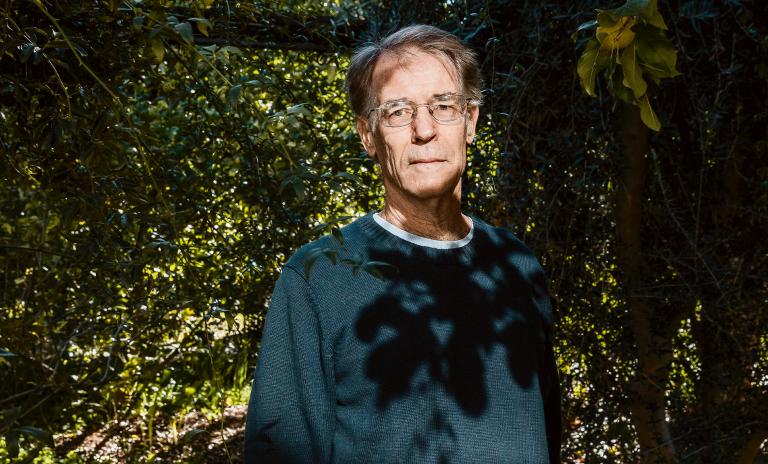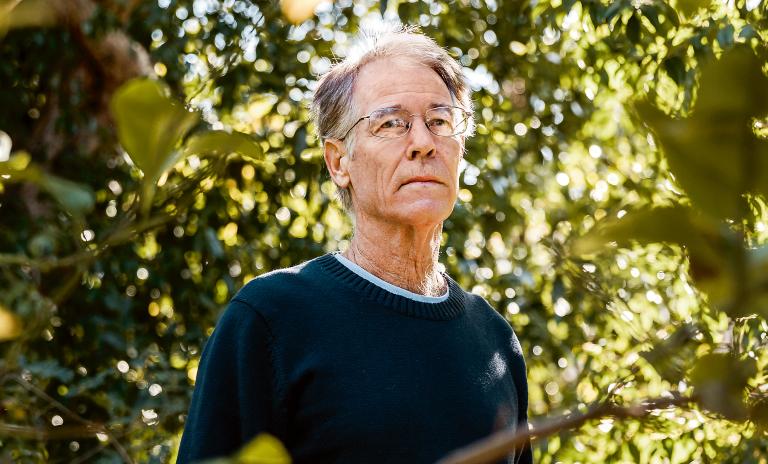Journey to the future
![{[downloads[language].preview]}](https://www.rolandberger.com/publications/publication_image/ta39_en_covers_1_final_download_preview.jpg)
What if we could journey to the future to gain insights for 2050 and beyond? Think:Act gives you a playbook for the future to adapt, survive and thrive.



by Steffan Heuer
Photos by Carolyn Fong
Bestselling science fiction novelist Kim Stanley Robinson has made it his life’s quest to package somber scenario planning into riveting stories. The worlds he builds offer a blueprint for how humanity can course-correct to survive catastrophic climate change and offer new ways of thinking we all could use as a manual for future planning.
Russell Boulevard is a four-lane road that bisects the Californian town of Davis, just west of the state’s capital Sacramento, funneling commuters to and from the campus of the University of California and downtown. If you leave Davis heading west, you will pass a collection of small communal gardening plots where cucumber and pumpkin plants creep along the ground, coexisting with patches of carrots, cabbage, onions and garlic, plus generous tufts of an inedible weed called purple nutsedge grass. Further back, persimmon and avocado trees and hedges of pomegranate shield homes from motorists’ views.

To American eyes, the master-planned Village Homes community is a most unusual suburb. Completed in 1975, it was a deliberate attempt to design both a walkable and environmentally conscious neighborhood where residents would forego garages, fences and front lawns, tending to and living off the land as a tribe of post-capitalist settlers instead. A total of 220 households would curate this small outlier of a biosphere, surrounded by freeways, malls and sprawl.
The most famous resident of this alternate world is arguably Kim Stanley Robinson, a prolific science fiction writer with 26 books and several prestigious literary awards under his belt. Most mornings, he puts on a battered North Face jacket, grabs a coffee and walks to his small plot to garden for a few hours. “Gardening is my refuge. I get my hands dirty and think about the scene I will write this morning,” he says on a gusty fall day, surveying what a scorching California summer has left of his crop. “We had a terrible drought. Everything might die and California’s in terrible trouble,” Robinson adds a bit later, seated outside the house where he has lived and written all his books since 1991.
He usually takes his laptop and settles into a beat-up, blue Ikea Poäng chair with a threadbare black footstool that he salvaged from somebody else’s trash, typing away for hours under a tarp. “I will admit it, I have become a hermit or something like a weird monk when I am writing,” the 70-year-old adds. It is here, in his village home, that Robinson keeps conjuring up worlds that have enthralled readers and, more recently, gotten him invitations from heads of state and planners at the Pentagon who are all eager to hear how human imagination can prevail over nature’s rage.
"Oftentimes, I’ve learned things in my research that even scientists don’t know because they are deep in their silos."
Robinson’s most famous book by far is The Ministry for the Future, published in 2020. A collage of gritty micro- and grandiose macro-level details, it chronicles humanity’s painful journey through an unfolding climate catastrophe starting in the year 2023. After a heat wave kills millions in India, a newly created UN body – the Ministry – is tasked with combating climate change and dealing with an eco-terrorist network that is going after fossil fuel-burning jets and the meat industry. By 2050, the global community has finally set aside its differences and is pulling all the levers at its disposal to avoid the worst. A combination of large-scale geoengineering projects and a new global digital currency called “Carbon Coin” that pays petrostates to leave their resources in the ground have given capitalism a new face and Earth a second chance.
The book has propelled Robinson into the uneasy role of being a “public intellectual,” as he phrases it, certainly helped by the fact that former US President Barack Obama put the novel on his list of favorite books. He was invited to the COP26 climate summit in Glasgow, roaming the halls and conference rooms with a red all-access pass, and continues to give talks and presentations around the world.
As Robinson sees it, he speaks before politicians and scientists to give them a literary pep talk and to jump-start high-level networking on Earth’s behalf because time is running out. “I am aware that everybody in the audience knows more than me. What I know is what science fiction does and how it operates. It’s discussing possibilities. I tell stories about the relationship between the individual and the collective. When facing a group of experts, I tell them a story about their area of expertise, pushed into the future, and I invite them to take over the thinking. Oftentimes, I’ve learned things in my research that even scientists don't know because they are deep in their silos.”
This steady gaze at both planet Earth and the human condition, grounded in scientific insights and without resorting to aliens and starships traveling at light speed, is the thread that runs through all of Robinson’s writings. At a talk in San Francisco in March 2022, he divided the science fiction genre into three categories: “space opera,” or a fantasy where anything goes; “near-future science fiction” that extrapolates today’s trends a few years out; and “future history” that explores what historical change is possible over larger expanses of time.
The latter is the “middle zone” where Robinson thrives because it allows him to lay out bold visions of how humanity might alter the trajectory of history if it only mustered the technologies and courage to drive systemic changes. “Science fiction has a certain power,” he explains over another mug of coffee that his wife Lisa, a retired scientist with the US Geological Survey, has brought to the porch. “It’s like a modeling exercise for civilization that says: This could happen, so pay attention. It’s tapping into prophecy, like the Old Testament. If you continue to do these things, you will come to this horrible fate. So, let’s think about doing this or not doing that.”
The approach was largely shaped by Robinson’s academic mentor, the American philosopher and Marxist political theorist Fredric Jameson. It was Jameson who steered Robinson toward the work of the famous science fiction author Philip K. Dick as the topic for his dissertation in 1982. His oeuvre, including Do Androids Dream of Electric Sheep? (which was later adapted into the movie Blade Runner) and The Minority Report, is usually populated by characters struggling with alternate histories and evil corporations or authoritarian systems. As a freshly minted Ph.D. in English literature, Robinson first taught composition to freshmen at the University of California for 11 years before becoming a full-time writer.

When he builds worlds far off into the future, or in some cases centuries or millennia into the past, the critique of capitalism and elements of Marxian historical materialism are hard to miss. That is, the notion that it isn’t the great men who shape history, but the people and economic development of societies. With a twist, though, since in Robinson’s books, scientists are the heroes of the people who come up with evolutionary and sometimes revolutionary solutions to drive fundamental change.
Take the Mars trilogy published between 1992 and 1996, a 2,000-page epic in which human settlers turn the red planet into a habitable place over the course of several centuries but can’t shake off their baggage from the one and only home planet. “Stan dealt with the idea of a planet as a tabula rasa where humans bring all the ideas and philosophies from Earth. You have Greens, corporations, and religious groups duking it out,” says Banning Garrett, a long-time friend and former Washington insider who worked with the intelligence community and ran the Atlantic Council's Strategic Foresight Initiative. “At its core, it’s a book exploring how socioeconomic ideas play out when you put them on a planet.” Robinson admits that more recent discoveries about Mars’ inhospitable environment make terraforming the planet an unfeasible fantasy. “These books dealt with what we knew about Mars at that time. It’s a science fiction novel, not a blueprint.”
"This time, growth might be reconfiguring itself as the growth of some kind of safety. Call it involution, or sophistication; improvement; degrowth; growth of some kind of goodness. A sane response to danger."
Back on Earth, Robinson put economics front and center in New York 2140. The city has been largely submerged due to a 15-meter rise in the sea level and traders living and working in the upper floors of skyscrapers make a killing from “intertidal arbitrage,” a euphemism for betting on global real estate that’s quite literally under water, while rebel programmers want to rewrite the rules that ail the system.
Then there’s a multigenerational spaceship called Aurora that takes off in the year 2545 from Jupiter, headed for the star Tau Ceti 12 light-years away to start a colony. Guided by a super-AI that also narrates large parts of the book, they make it to their destination, but realize too late that their best hope is to safely return to Earth. As a testament to Robinson’s meticulous research to avoid producing a space opera, he sought out the help and mathematical firepower of friends at the NASA Ames Research Center in Mountain View and at UC Berkeley to help him map the crew’s return to Earth.
Since the craft uses the gravitational push and pull of the solar system’s bodies to slow down for re-entry, Robinson had to figure out a realistic way to slingshot them around space. “They told me you can only pull off this maneuver if the big planets are in a special configuration and that will not happen until 2894. That’s why Aurora goes out into the year 2894. Ironically, nobody has noticed how careful a science fiction writer I am.”
World-building against the odds also is the theme of the novel 2312 that takes readers to a human settlement on Mercury in the year 2312. It comes under existential threat by an artificially designed meteorite and is eventually destroyed by the sun. The protagonists go to work restoring and rewilding an Earth wrecked by market-based capitalism. The deficiencies of the free market and the need for transnational government action is a theme that Robinson would return to in Ministry.
“I’m not for capitalism – it sucks,” Robinson says. “Everybody should have a good life. People talking about adaptation in the way that capitalism can solve everything are wrong. I think we’re in a scary race between success and failure.” At his March 2022 San Francisco appearance he went into more detail: “There will be post-capitalism one day, but right now what we need is green capitalism and government intervention big time. I am an old hippie leftist, you know my angle. From that angle I say: tech. Whatever works to dodge the mass extinction and then solve the outstanding problems.”
"Everybody should have a good life. People talking about adaptation in the way that capitalism can solve everything are wrong. I think we’re in a scary race between success and failure."
Silicon Valley forecaster Paul Saffo, a long-time acquaintance of Robinson’s, sees this realistic scenario planning mixed with outspoken activism as the fundamental appeal of his work and what sets it apart from other sci-fi books. “What he's really talking about is humanity and adaptation. He is a systems thinker. His books are about how human societies create things, even if it’s on other planets.” He thinks the book has garnered attention in high places because of both its timing and its core message. “Until then, everything about the environment was doom and gloom. Telling people depressing stories about the future accomplishes nothing.”
Garrett, who read the manuscript and gave frequent feedback, agrees: “Ministry is one of the most important books of our time. This is the book that helped us find a path for survival and sustainability. Stan told me he wanted to write a book about what happened if things go right. Humans make all the rules, so we can change them! It’s an effort to say there are alternative futures out there.”

The outside world seems to be taking cautious steps in the direction Robinson has sketched out. There is indeed a global network of 89 central banks called Network for Greening the Financial System and the recent COP27 summit was dominated by talk about mitigating climate change. Robinson is an avid reader of scientific journals and has a network of experts to help him work insights into his books. “I wouldn’t say I’m an optimist. I’m frightened and say let’s focus on what we can do. That’s not quite the same thing as optimism. I try to tell good stories and try to save only 10% of my writing and speaking life to denunciations of bad practices.”
In August 2021, Robinson added a coda to his novel in a talk for the influential content platform TED. Robinson read a letter from the year 2071, looking back on what humans pulled off to save themselves: seeding the atmosphere with dust to reflect sunlight, pumping meltwater from underneath glaciers, reorienting the world’s fiscal system. He ends the videotaped address with a grateful look back on the present: “We now live on the carbon standard. We take that for granted. But it was a challenge no generation had had to beat. That they did it is something we should be grateful for, and indeed, the more historians like me look at the 20s, the more amazing they become. People really stepped up.”
Given the international success of Ministry, Robinson says he will hold off on writing another science fiction novel, hoping that scientists and statesmen really do step up. Peering into the persistent drizzle that has set in, he says: “I can’t possibly do anything as important – and I would be messing up my own project.”

![{[downloads[language].preview]}](https://www.rolandberger.com/publications/publication_image/ta39_en_covers_1_final_download_preview.jpg)
What if we could journey to the future to gain insights for 2050 and beyond? Think:Act gives you a playbook for the future to adapt, survive and thrive.
